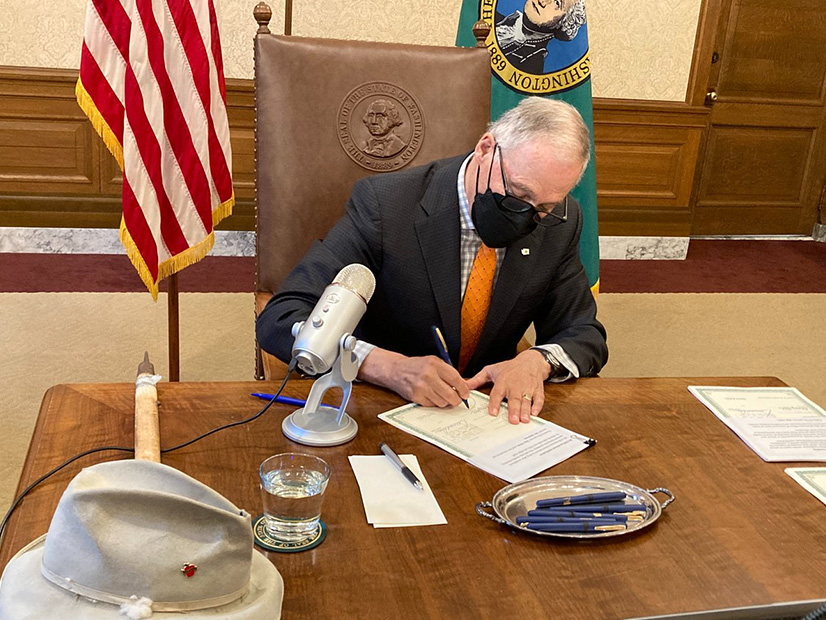Washington Gov. Jay Inslee on Friday vetoed a section of a state energy siting council expansion bill that called for a study of the impacts of solar and wind farms on rural areas.
The veto drew criticism from two Republican representatives from rural Eastern Washington, where most of the state’s solar and wind farms have been located. A common complaint from critics of wind and solar farms is that wide-open rural Eastern Washington hosts most of the projects while the electricity produced there goes to heavily populated and forested Western Washington.
The Democrat-controlled legislature this month passed House Bill 1812, sponsored by Rep Joe Fitzgibbon (D), to take Washington’s Energy Facilities Site Evaluation Council (EFSEC) outside the umbrella of its parent, the Washington Utilities and Transportation Commission, and make it an independent agency. (See Bill to Expand Powers of Wash. Siting Council Passes Senate.)
EFSEC, comprising representatives from several state agencies, makes recommendations to the governor for final decisions on the placement of solar farms, wind turbines and other energy resources.
Under existing regulations, a wind or solar developer opting to seek state approval instead of obtaining county permits can bypass county governments by going through EFSEC. Or a developer can choose to have the appropriate county government handle the permitting, sidestepping EFSEC.
Besides being an option for wind and solar ventures, the expanded EFSEC will also have jurisdiction over clean energy product manufacturing facilities, renewable natural gas facilities and hydrogen production plants.
The vetoed section of the bill would have required the Washington Department of Commerce to meet with rural stakeholders to prepare cost-benefit reports on renewable projects, including recommendations on how to more equitably distribute costs and benefits of energy projects to rural communities.
In his Friday veto, Inslee wrote that meeting with rural stakeholders is important, but he said that existing studies and meetings are already underway on the issue, including a study on the drawing board by Washington State University. Inslee also wrote that the supplemental budget for fiscal 2023, which begins July 1, 2022, does not include money for the study requested by House Bill 1812. He wrote that the legislature should request such money in its 2023 session.
On Friday, Reps. Mary Dye (R) and Mark Klicker (R) issued a joint press release condemning the veto. “To say that we are beyond disappointed with the governor’s vetoes is an understatement,” Dye said.
“It is critical for our rural communities and local landowners, especially those in Eastern Washington, to see the big picture of what 30 years of siting utility-scale wind and solar would do to Washington’s rural landscape,” Dye said. “Now that the governor has vetoed these sections, it opens the flood gates for big out-of-state energy corporations to swoop into these small, rural economically-disadvantaged communities and offer leases at a fraction of the value of the agricultural land to struggling farmers and landowners. It’s absolutely devastating to our Eastern Washington farmlands.”
“Those who are living where the green energy is being sited know that the jobs and tax-base impacts have been more salesmanship than substance,” Klicker said. “We asked for a study to show the true costs and benefits, and the governor’s vetoes show we were right to be skeptical. If there was going to be good news about jobs and taxes from these projects, the governor surely would have wanted that documented.”
Dye added: “The governor’s strategy amounts to a hasty build-out of clean energy to serve the Puget Sound without any burden of siting massive wind farms in the Puget Sound view shed. Instead, these facilities will all be sited in our rural counties that have no need for the energy and are already served by clean, affordable hydroelectricity.”



